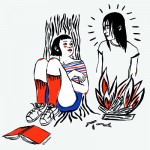by Caroline Copeland
Support independent, non-corporate media.
Donate here!

Ever since Valentina had fallen into the world, into the family who should have loved her, she had found herself alone. She was always a step removed, at a distance from them, of less importance even than the sisters yet to be born. Confused, she stumbled around in the loneliness of that world, before teaching herself how to fly, high beyond the darkness and the expectations of her mean-spirited family.
It started early, in primary school with a library book, a picture book of torn and turned down pages where she discovered ballet dancers, musicians, and Shakespearian actors, people she’d never seen before. She practised being the performers in those drawings, became adept at the near-impossible task of standing on her toes. “Freak” her eldest brother hissed. She took care not to be caught being a ballet dancer again, and moved on to reading stories from books aloud, in the same voice as the children’s television presenter she liked. The woman with the palest blue jumper and the encouraging smile.
She got quite good at that till her other brother caught her reading in front of her mother’s bedroom mirror, enjoying the way her mouth shaped the words. He ran through the house, the book held high above his head, copying the voice that Valentina had been perfecting. He looked and sounded ridiculous but Valentina was the one they laughed at.
She knew then she had to hide who she wanted to be so she kept her reading inside her head, and behind a locked door, where she could be the real Valentina. She’d been on the lookout though for people and places that felt like who she wanted to be: the teacher at high school who smelled of lemon soap, the television actress with the voice full of light and colour, the big library filled with magic words. Now that Valentina knew magic existed, she longed for it in her own life.
Despite her exotic name, the Valentina everyone saw was very ordinary, and people seemed to expect a girl called Valentina to be special, like someone they’d seen in a magazine: glamorous. In the first year of high school she’d tried calling herself Val, but that had elicited more ridicule. “You’re no Val, you’re Valentina.” “Valentina” pronounced in an accent they’d heard on television, in a time when television presenters didn’t sound like anyone you would know. “But if ye dinnae like Valentina we’ll call ye ‘Specky.’ You’ll no forget that name ”
“Valentina? How do you spell that?” Teachers would ask, unaware they were prolonging her humiliation. So, despite her name, and the secret lives she practiced in front of a mirror, Valentina made an effort to be ordinary. Her family seemed to want that. Milk bottle specs and a squint fringe, cut too short by a hairdresser who didn’t know when to stop. Her brothers loved to point out these inadequacies, which Valentina had come to see as her personal failing. The middle of five children, the two eldest boys loud and handsome, every word that came out of their mouths brought a smile to their mother’s face: the two youngest girls cute and charming, standing on the rug in front of the two-bar electric fire, singing pop songs that everyone admired and applauded. Valentina in awe of their ability to please. She had no quick-witted jokes or party pieces that would do anything but make them laugh at her.
Valentina existed in the middle-child’s no-man’s land, but not looking nor sounding like her siblings. Teachers always did a double take when they discovered the family she was from. She tried to blend in, be the same as the people her family seemed to like. She practiced putting on make-up, the type worn by her brother’s girlfriends, thick black eyeliner and lips bruised purple with gloss. She rehearsed in front of the bathroom mirror till she got it right, and was brave enough to face them.“What are you like” one brother hissed when he saw her. “You’re no goin’ out like that” her mother said.
At school she was unexceptional and for that she was glad. She was invisible. In the middle section of every class, not top nor bottom, a bit like at home. At school though that meant you weren’t singled out. Valentina whiled away her high school years, detached from everyone around her, suppressing the life that she could feel burbling inside her. Locked doors and an empty house were her friends, privacy to rehearse one sided conversations and time to practice who she wanted to be. She’d long-ago moved on from her favourite library books and TV presenter’s voice.
She’d discovered films which showed her other ways of being. She practiced these lives in secret, away from her family. Other people’s lit windows on autumn evenings provided a glimpse of another kind of life, table lamps casting pools of light on well-tended pot plants, bookcases crammed with neatly shelved books. Occasionally she would catch fragments of conversation through open windows, voices from the radio, the chink of cutlery on matching plates, restrained, orderly: until she turned into her own street where long-played arguments were broadcast between rooms and even houses, canned laughter from blaring televisions, all life illuminated by a hundred-watt bulb hung from a central pendant. The big light. Doors slammed.
There were too many of them for their terraced council house. Seven souls crammed into two and a half bedrooms. The living room sofa doubling as a bed when their Nan came to stay. Her Dad complaining about tripping over broken toys, nowhere to sit
because of the endless ironing pile. The broken lock on the bathroom door, and the smell of chip fat floating over it all. The only thing that marked their house out from the neighbours’ was a plant pot on the front step. At one time it had been filled with hope and brightly coloured spring bulbs, telling the story of a dream that her mother once had. Of a time when they still shared a half bottle of vodka on a Saturday night before the dancing, when there was still money for a new dress that spun around her when she twirled. Spinning away from the monotony of her days. The time when she’d dreamt of escaping, when she’d wanted things for herself and still had the courage to believe she could get those things. Until the day she had wanted the wrong thing, the wrong person.
When Valentina’s exam results were posted through the broken letterbox neither parent was interested enough to be there. Valentina opened the envelope alone, after making sure her younger sisters had breakfast and before she took them to the local authority holiday club. Her English teacher was pleased though. She used the word ‘delighted’ and Valentina had practiced saying that word in front of the bathroom mirror. ‘Delighted,’ she’d mouthed, opening her eyes wide and smiling like Mrs Thompson had done when she’d said the word that Valentina had only read in books. The word made Valentina feel light, like the ballerina she’d once pretended to be. People at school had looked at her differently then, admiringly.
Mrs Thompson had spoken about colleges and universities and ‘getting away.’ That night, as they all sat at the kitchen table, Valentina announced that her results had arrived. There was no break in conversation. Everyone kept eating. Her mother chewed,
concentrating on every bite. Her brothers, fresh in from work, kept talking, not lifting their heads from their plates. Once she managed to swallow, her mother urged her wee sisters to finish their dinners, even though they had. Only her dad lifted his head from his plate and paused.
Urged on by this level of interest Valentina stood to put her plate in the sink, announcing in a trembling voice that she refused to give in to,“I got five As.” She said it with great dignity, like she was a person used to talking about herself. The person Mrs Thompson saw.
The male side of the table stopped eating. “You’re joking?” Her eldest brother laughed. “Who? You?” The second brother, slack jawed.
By this time her mother was looking at her. “Five As?” And then her dad, “Well the apple doesn’t fall far from the tree eh.”
Valentina spent a further year in school passing exams, and preparing herself for the world she’d been imagining, still continuing her silent, imaginary conversations. The details of these conversations were fleshed out by what she read in books borrowed from the local library. Stories about girls not like her, beautiful girls with the right clothes for the right occasion, who said the right thing at the right time, and who were never red faced with embarrassment. The more she practised the better an actress she became.
From school she went to a university in a city far enough away that nobody from home would visit. Libraries and hidden corners were still her friends, the privacy of her bedsit a sanctuary. The time she spent studying was rewarded by a First in English Literature. It came at the same time as a new haircut that accompanied her to another University.
She’d worked out by then that the trick to looking like you belonged was to look like you hadn’t tried, but looking like you hadn’t tried took a lot of effort. Make-up had to look like it was barely there. Back home hairstyles of bleach and wild colours, and copy-cat cuts taken from cheap magazines were replaced by photos of off-duty art house actresses. “I want something like this” she would say to the hairdresser she couldn’t quite afford.
Each academic advance was accompanied by a more fitting look for the person she was becoming. The pretending she’d once practiced in private, the remembering of phrases and lines from books and films: the time spent reading in libraries and empty rooms fed seamlessly into her new university life. She was becoming the person she’d once dreamt of becoming.
It was around this time that Valentina began to make eye-contact with people, even men. Imaginary conversations were brought from behind closed doors and played out in public, tentatively at first, but fuelled by their interest in her, Valentina began to wonder about whether she was interested in them.
By the time she’d finished her PhD her hair and face fitted her surroundings, but still she was the person looking in, rather than being part of the thing. There was always the danger she would slip up and they would find out that she didn’t belong. It didn’t matter how hard she tried, how quickly she learned, what she read, she lived in dread of not knowing about the things she’d never known about.
A faculty party, juggling a glass and a plate and being asked to pass the hummus. “The hummus.” The woman with the cats-eye specs pointed her vicious red nails in the general direction of the table and Valentina. “Pass me the hummus,” she shrieked. Valentina had stood, instantly unable to see the table in front of her, not knowing what hummus looked like, not knowing what it was. Cheap prosecco making her forget the need to be on her guard. The buffet swirled before her eyes. “What does it look like?” She stuttered, as everyone turned to look at her. The laughter started then, like Valentina was trying to be funny, and when her face told a different story, there was an embarrassed pause, a silence as they tried not to look at her. “That girl doesn’t even know what hummus is.” The shrieking woman again, brandishing a bread stick as she retreated into the crowd on her towering heels, gesturing behind her at Valentina. “Doesn’t even know what hummus is.” She repeated almost to herself, shaking her head in disbelief as everyone tried to ignore her, but Valentina knew that it was she who was the embarrassing one. She wouldn’t let her guard slip again.
On one of her last trips home she didn’t try to hide who she had become. She didn’t care what they said to her, and because she didn’t care, they said nothing, just sideways looks from her mother that Valentina ignored. As she left that night, she lifted her new coat from the hook at the front door, wrapping its soft wool around her, belting it against the chill, her mother took her in, viewed her from top to bottom.
“Don’t you be getting above yourself,” she warned, keeping her voice secretly low and not quite threatening. Then she stared at her hard, like she was trying to convey something important. But this time Valentina didn’t pretend not to see. She looked back at her mother and lifted her gaze to meet her eyes. “Why? What is it I’m not meant to be? What is it you don’t want me to do?” Her mother just shook her head and pursed her lips, like it was all Valentina’s fault.
Three years after she completed her PhD, he became her boss. He wore a dull, wide, silver wedding band. He seemed to like her as she liked him, in a way that Valentina had never experienced before. He was fifteen years older than her and laughed at her jokes. They started to meet in local cafes, pots of Earl Grey and hulking anthologies of Scottish Poetry. He was an admirer of Douglas Dunn, and she quickly acquired his complete collection. They would slip in lines of his poetry to ordinary conversations. As he passed her a pen he would quote, “a poem trapped in an empty fountain pen.”
On a Monday morning in June, she told him she’d spent Sunday at the Scottish Colourists exhibition. “I don’t know much about them. I don’t know much about art really,” he’d said. Valentina wondered about the confidence required to utter this simple phrase.
The way his eyes crinkled when he smiled at her made her feel lightheaded. They shared a love of scones and T.S. Eliot. There was no hint of impropriety, they were colleagues, even though Valentina felt a burning inside her whenever they were together. Absentmindedly caressing her own face, running her fingers across her forehead, down her cheeks, letting them linger on her throat. They never touched, just talked, discussed, and ate their scones, pretending not to watch each other lick jam from their fingers. She loved to watch him eat, trailing her finger along her own bottom lip instead of reaching across the table to wipe the crumbs from his.
One evening he invited Valentina to dinner with colleagues from another university. They sat around a table in a French restaurant and Valentina realised that she was the person everyone turned to look at whenever she started to speak, a smile on their lips and a nodding of their heads, agreeing with her without saying a word. Hands reaching out to touch her arm, seeking her attention, finding her witty, just like he said she was. He looked proud of her and she almost forgot who she really was. Later, in the restaurant loo, she caught sight of herself in the mirror, not recognising the woman she’d become.
When everyone was getting into taxis and making for the train station, Valentina didn’t want that evening to end. He asked her if she’d like a nightcap. The bar was quiet, it was late. The lights were dim, and Valentina, unused to the excesses of wine or flattery relaxed into her new role. When he suggested he walk her to her flat, she worried he might miss his last train home. When she woke the next morning, he was no longer there. When he reappeared the following day, no mention was made of what had happened between them.
The usual rhythm of their work life continued. The announcement of her promotion was accompanied by an overheard conversation in the staff common room. Valentina’s face burned with the kind of shame her family had once made her feel as she heard a colleague
announce that she was “getting above herself,” just as her mother had said. It occurred to Valentina then that you could leave your past behind, but everyone still had an opinion on you.
Following her promotion, Valentina had laser eye surgery to end her chronic short-sightedness, and bought a wardrobe of colour-coordinated clothes recommended to her by a personal shopper. As she tried on these clothes, she imagined scenarios where she would wear them, a time when they would live together in a softly lit house. Evenings spent on a sofa with the subdued lyrical sounds of a jazz singer in the background, the feel of his body pressed against hers. She played fragments of longed for conversations in her head as she tried each outfit on. Looking at herself in the mirror, achingly running her hands over the fabric of each one.
“We said we’d meet them in the restaurant.” “We just love the jazz bar on a Sunday evening, don’t we sweetheart.”
“You’ll have to unzip me darling.” “You looked stunning tonight Valentina.” When two months later they found themselves alone in his office at the end of a day of meetings, he turned the conversation to personal things: To “them”. She felt the rush of longing rise inside her again. She no longer fought the urge to press her body against his.
Three months of secret lunches, and afternoons in cheap hotels later, she looked at herself in the mirror and didn’t feel like the past anymore. She couldn’t remember the last time she’d had a conversation with the person she’d once been. It was as if the old Valentina had disappeared, or had never even existed.
Her imaginings became real: just the two of them in crowded bars and restaurants fuggy with the heat of boeuf bourguignon, not quite too much wine but nearly, fingers accidently brushing against each other, eyes on lips, lips against ears. Weekends in Vienna and Strasbourg, nothing as prosaic as Paris for them. Slipping into concert halls and churches, arias and librettos creating the soundtrack to their indiscretions. Wandering hand in hand through cathedrals and markets. “Two hundred paces west of the big basilica,” one of them quoted from Dunn when they got lost. Just the two of them.
When the worst thing happened, she went to the clinic on her own. She had to make sure it was just the two of them. She didn’t tell him. She didn’t want him to think that she was anything less than completely dependable. When she returned to the office the next day, he didn’t ask where she had been. He had to leave early, he had things to do at home he said, as he frantically searched on his crowded desk for something lost among the piles of papers and folders. “The office emptied of its archival dross, Papers re-read and chucked …” Valentina recited from one of his favourite Dunn poems. He didn’t seem to remember it.
That was ten years ago, ten years since the university decided that Valentina’s job was no longer required. Valentina works part-time now at a small college on the outskirts of Aberdeen. She’s always on the lookout for extra hours to supplement her salary. Some days she stands in front of her wardrobe, clothes from her old life: Carefully cut suits and coats, cashmere cardigans in perfectly muted shades of caramel and taupe wrapped in plastic to keep out the moths. Never worn silk dresses cut on the bias, draping from shoestring straps. “I’m fond of ball gowned ladies.” She mouths to herself as she lets the soft cool fabric run through her fingers.
She’s adept at blending in to her new surroundings, avoiding questions, turning down invitations. A lifetime of learning. She felt him before she saw him as she passed through the shopping centre. Nineteen seventies concrete and public art that had become a children’s play slide. They were leaving a cafe, he was holding a woman’s hand. Laughing, he turned his head to say something to the two young boys trailing behind them. As he got closer, he saw her. He stopped and smiled at her, or perhaps it was the remnant of that laugh. He smiled like there was no history, no pain. In that moment, as the sliding children and passing shoppers went into slow motion around her, Valentina instantly saw that for him there had been no pain. She had been a game, something that had caught him out. An inconvenience.
It struck Valentina how ordinary he looked, how he’d aged, his head bald, his skin papery, lean, very lean, like the life was ebbing out of him. He no longer looked like the type of man who would engage in witty conversation in a fuggy French restaurant. His smile was the same though, and Valentina remembered how that smile had made her feel. She had been sure that life with that smile would feel like she was flying.
He introduced her to his wife. The kind of woman with the right type of hairstyle who didn’t need a career, not when she had his two boys to look after, and him to look after her. He still wore that dull silver band, wide on his ring finger. “How are you Valentina, goodness you’re the last person I expected to see here?” As if he didn’t remember what had happened. Boring conversation, not the type she’d imagined when she’d been with him, when she thought they’d be just the two of them, together.
A lifetime of looking in on other people’s lives made her want to know about his marriage, their marriage, what their house was like inside, where they went on holiday, the playlists they listened to when they had dinner parties. She felt like she wanted to get close to the largeness of his life. To feel what that felt like again. She wanted to ask if he ever thought about her?
“Valentina was a junior colleague, a long time ago . . . what, ten, twelve years ago?” But he didn’t wait for her to respond. “What subject was it you taught now? English! Yes, you were in the English department.” He nodded, answering his own question, so convincing that she began to wonder if she’d imagined everything that had happened between them. They were visiting his wife’s relations he explained, in Aberdeen for the weekend. She must drop him a line. Yes, he was still at the same university, he was the Vice Chancellor now. He was glad to see her again.
She knew that he would think about her now, and that if she did write to him, they would see each other again. But as he stood there in front of her, a step closer than he should, his head inclined towards her, a benevolent smile on his face, she was reminded of a bad actor trying to convince an audience that he was someone, something that he wasn’t. It wasn’t the kind of film that she would want to watch anymore though. She smiled, a much better actor than he could ever be, and reached out, touching his arm in a just so slightly dismissive way, shaking her head so he knew, and his wife knew, that that would never happen. A woman like Valentina would have no time for a man like him.
As they walked away in their noisy, messy, family gaggle, she watched them, and so attuned had she been to his every movement, saw his head droop just a centimetre or two, saw the miniscule change in his posture, his stature. She continued to watch as he
transformed into a child’s drawing of a stick man holding the hand of a stick child, walking off into the distance. Valentina felt the breath inside her expand, filling her lungs, the sound of its power roaring in her head. Her breath surged from her body, and she watched it fly above the shoppers, and the children playing hide and seek amongst the concrete art, before it reached him, and she blew him away, forever. Turning, she saw herself reflected in a shop window, saw herself rising up, soaring above the shopping centre, flying. Flying towards the many lives she had yet to live.









